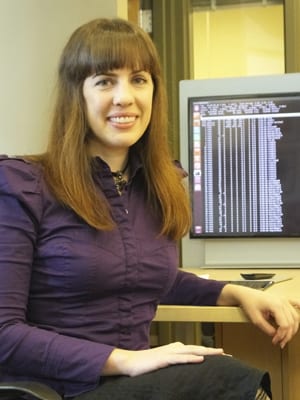News
Bioinformatics Progress at BTI

Contact Suzy Strickler at srs57@cornell.edu, or attend the BTI bioinformatics hour Wednesday afternoons in the resource center.
Can computers create better crops? These days, any plant scientist will say yes, as computing is now a major tool in their arsenal. Bioinformatics, which simply refers to the use of computers to access and analyze large amounts of biological data, allows scientists at BTI and beyond to harness digital power for streamlining, expediting, and enhancing their research. “It’s pretty hard to avoid bioinformatics these days, because biology is so data rich,” says Susan Strickler, BTI Research Associate and Bioinformatics Concierge. “Plus, it allows for a more immediate way of addressing research questions.” BTI Assistant Professor Lukas Mueller, who helps head up the program, reiterates how integral bioinformatics now is to life science research. “A few years ago, biology went through this huge transformation in which we were able to easily genotype things,” he says. “While it became technically feasible, dealing with all that information became a problem that we weren’t quite ready for—for example, one sequencing run can produce many gigabytes of data, so researchers really need an effective way of managing information.”
BTI is well ahead of the curve, with a specific bioinformatics program in place to help all faculty and students understand and utilize digital computing tools for their research. The program, spearheaded by BTI’s VP for Research Karen Kindle and run jointly by Lukas Mueller’s and Zhangjun Fei’s lab groups, features a semester-long course in the spring, weekly information hours, and dedicated, in-house servers that can store and process the huge amounts of data produced by plant research.
The bioinformatics course covers key concepts such as RNASeq analysis, UNIX programming, and basic NGS data management, while the weekly bioinformatics help hour gives researchers an opportunity for more immediate advice and training. “Before the program, people were bashful about asking for help,” says Strickler. “Now, they feel more comfortable coming in to our information hour for assistance. It’s always very satisfying to help someone learn something new.”
Beyond the educational angle, the program fits at BTI, where our researchers—including Dr. Mueller and Dr. Fei—have played major roles in several large sequencing projects, to map and identify all the genes in key plants and crops, such as cassava, major Solanaceae species such as tomato, potato, pepper, nicotiana and eggplant, as well as coffee, watermelon, kiwi, and cacao.
A clear success, the program shows no signs of slowing down. “The volume of interested people continues to increase,” says Strickler. “I am excited to see where this goes in the future.”

